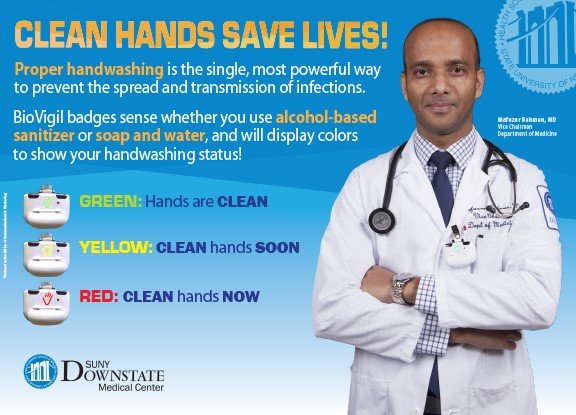SUNY Downstate Health Sciences University Launches State-Of-The-Art Hand Hygiene Program To Help Prevent The Spread And Transmission Of Infection
Mar 27, 2018
SUNY Downstate is the first in New York City and the first SUNY Hospital to implement the BioVigil Hand Hygiene System

Brooklyn, NY— SUNY Downstate Health Sciences University (Downstate) launched a novel initiative to improve hand hygiene with the new state-of-the art BioVigil system to increase compliance by Downstate staff on proper hand hygiene to prevent the spread and transmission of infections. According to the U.S. Centers for Disease Control and Prevention nearly two million patients annually contract healthcare-acquired infections (HAIs) in hospitals nationwide, and nearly 100,000 people die as a result. BioVigil provides an effective way of reducing the spread of HAIs by reminding our caregivers to clean their hands before and after caring for patients.
BioVigil develops systems that improve the overall health and safety of hospital patients and staff by electronically monitoring hand hygiene. The patented technology drives point-of-care behavior modification and engages patients in a culture of safety. BioVigil makes it easy to hold healthcare professionals accountable for their hand hygiene, and to bring hospitals one step closer to fighting HAIs. The BioVigil badge tracks hand cleanliness in real-time, and with 97 percent sustained hand hygiene compliance.
SUNY Downstate is the first Academic Health Center and hospital, the in first in New York City, and the first in the SUNY system to use the BioVigil program which will be rolled out to 1,875 healthcare staff who provide direct care to Downstate’s more than 72,756 patients each year.
Handwashing and the use of alcohol-based hand sanitizers are the most effective methods of preventing the spread and transmission of infections. Hospital staff wear BioVigil badges which, when used properly, sense when they have used alcohol-based sanitizer to clean their hands. Like traffic lights, the badges use red, yellow, and green to indicate if the user is handwashing-compliant letting patients know instantly whether their caregiver’s hands are clean. Green means hands are clean and in compliance; yellow is a reminder to wash hands upon entering a patient’s room, and red means non-compliance and hands must be washed immediately.
Communicating with infrared sensors (beacons) installed throughout patient care areas, the BioVigil badge is designed to monitor and detect each user’s hand hygiene activity; statistics are recorded and then downloaded when the user returns the badge to a base station. During its pilot period, Downstate collected more than 1.2 million hand hygiene observations in its first phase of 8 months.
“Proper hand hygiene reduces HAIs in any healthcare setting, and we are ready to launch the BioVigil program at Downstate’s University Hospital at Downstate,” said Downstate president Wayne J. Riley, M.D. “As part of an overall plan to aggressively decrease hospital acquired infections, it is a key element to improve the overall quality of care we provide our patients.”
“The BioVigil technology presents a simple way to encourage physician, nurse, and staff involvement to improve the quality of the care we provide,” said University Hospital Senior Vice President for Hospital Affairs Bill Walsh. “Our hospital administration and Downstate leadership have made the commitment; we expect this to be a successful program where we can enhance patient confidence in their individual care.”
“We anticipate a decline in HAIs as the compliance rate of hand hygiene increases,” said Downstate VP and Chief Nursing Officer Margaret G. Jackson. “Working towards clean hands at the point of patient care every day and sustaining this practice is a vital part of the patient safety culture change, and key focus of health care policy. It is a simple, yet critical intervention to keep our patients safe.”
"Reducing HAIs in hospitals and the wider community is a top priority for Downstate,” said Dr. Mafuzur Rahman, Vice Chairman of the Department of Internal Medicine. “As an academic medical center with new staff every July, this education will continue through the arrival of new medical residents and other hospital workers.”
“Infection prevention is something that everyone in healthcare needs to promote, and hand hygiene is the most basic and effective measure,” said Epidemiology & Infection Control Director Robert Gwizdala, MPH, RN. “The BioVigil system instills confidence in patients and their family members that their caregiver is taking the proper precautions to prevent the spread and transmission of infections.”
About BIOVIGIL Healthcare Systems, Inc.
BioVigil is the market leader in hand hygiene solutions. Headquartered in Ann Arbor, MI, BioVigil’s patented technology enables hospitals to sustain 97 percent hand hygiene compliance and reduce Healthcare Acquired Infections with a gentle reminder system that increases patient engagement. At the center of the solution is BioVigil’s Data Suite which delivers actionable insights for hospitals to optimize workflow.
###
About SUNY Downstate Health Sciences University
Downstate Health Sciences University in Brooklyn is one of four academic health centers (AMCs) in The State University of New York (SUNY) 64-campus system and the only SUNY AMC in New York City dedicated to health education, research, and patient care for the borough’s 2.7 million residents. Its flagship hospital, University Hospital at Downstate (UHD), is a teaching hospital and benefits from the expertise of Downstate’s exceptional medical school and world-class academic center research facilities. With a staff of over 800 physicians representing 53 specialties and subspecialties, Downstate offers comprehensive healthcare services to the community.
UHD provides high-risk neonatal and infant services, pediatric nephrology, and dialysis for kidney diseases and is the only kidney transplantation program in Brooklyn. Beyond its clinical expertise, Downstate houses a range of esteemed educational institutions, including its College of Medicine, College of Nursing, School of Health Professions, School of Graduate Studies, and School of Public Health. Downstate fosters innovation through its multifaceted biotechnology initiative, the Biotechnology Incubator and BioBAT, which support early-stage and more mature biotech companies.